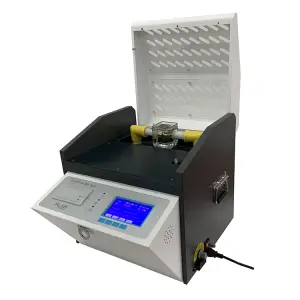Dielectric strength oil testers also callled breakdown strength tester, are indispensable tools in ensuring the safety and reliability of electrical equipment by evaluating the dielectric strength of insulating oils. Through their precise measurement of breakdown voltage, these testers help maintain the integrity of electrical systems, prevent accidents and failures, and extend the lifespan of valuable electrical assets.
Dielectric Strength Oil Testers:

Dielectric strength tester, also known as breakdown voltage testers or oil Bdv testers, are specialized devices designed to measure the dielectric strength of insulating oils used in electrical transformers, cables, and other high-voltage equipment. These testers evaluate the oil’s ability to withstand electrical stress and prevent electrical breakdown, ensuring the safety and reliability of electrical systems.
Principles of Operation:
High Voltage Generation: Dielectric strength oil tester generate high voltage, typically ranging from a few kilovolts to hundreds of kilovolts, using high-voltage transformers or other voltage sources.
Sample Preparation: The insulating oil sample is carefully prepared by removing impurities, moisture, and air bubbles to ensure accurate test results.
Electrode Configuration: The oil sample is placed in a test cell with specific electrode configurations, such as sphere gaps or needle gaps, to create a controlled electric field.
Voltage Application: The high voltage is gradually applied to the oil sample through the electrodes, increasing at a predetermined rate.
Breakdown Detection: The dielectric strength oil tester monitors the current flow through the oil sample. When the breakdown voltage is reached, the oil loses its insulating properties, and a sudden increase in current occurs. This breakdown is detected by the tester’s sensitive circuitry.
Measurement and Display: The dielectric strength oil tester records the breakdown voltage value and displays it on a digital display or indicator. This value represents the dielectric strength of the oil sample.
Factors Affecting Dielectric Strength Test Results:
Oil Quality: The presence of contaminants, such as moisture, particles, or dissolved gases, can significantly affect the breakdown voltage of the oil.
Temperature: The temperature of the oil sample can influence the test results, as higher temperatures tend to lower the breakdown voltage.
Electrode Configuration: The shape and spacing of the electrodes used in the test cell can impact the electric field distribution and, consequently, the breakdown voltage.